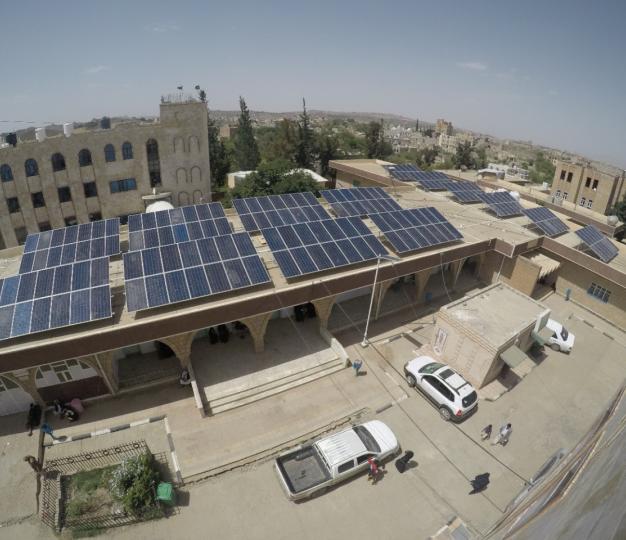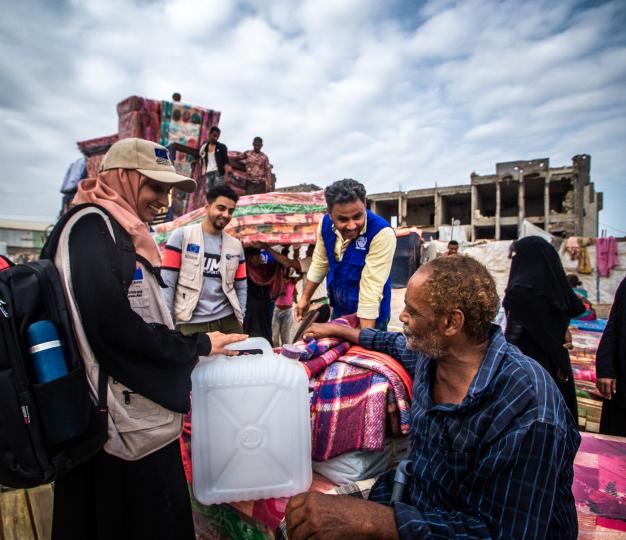RELATIONS WITH THE EU
The European Union and Yemen
The EU is a longstanding partner of Yemen. It is one of the leading donors to Yemen, especially to the social and economic sectors, and humanitarian aid. The EU’s engagement in Yemen rests on three strands: Political, humanitarian and development support. Since 2015, the EU's overall support for Yemen amounts to approximately €1 billion.
Political relations
The EU enjoys longstanding relations with Yemen, which date back to July 1998, when the relationship was formalised with the entry into force of a bilateral cooperation agreement focused on commercial, development and economic cooperation. The agreement laid the groundwork for a long-term partnership between the EU and Yemen in these areas and beyond.
The EU Delegation to Yemen has been operating from Amman, Jordan, since 2017. EU’s engagement with Yemen has expanded in recent years despite the challenging environment in the country. Several EU-funded projects have been launched and others scaled up to respond to the growing needs in the country.
The EU remains very active at the political level, supporting the UN-led efforts and broadly advocating for an inclusive political settlement in Yemen in close coordination with the UN Special Envoy and his office (OSESGY). The EU’s top political priority in Yemen is to end the devastating war and help bring Yemenis together to rebuild their own country. In this regard, the EU actively engages with all parties to the conflict in order to bring relevant stakeholders together and help build trust among the rival parties. The EU also works to increase the inclusivity of the peace efforts by opening it to all relevant actors, including civil society, women and youth. The EU is committed to the promotion and protection of human rights in Yemen and continues to advocate for the full respect of international law, including International Humanitarian Law (IHL).
EU’s trade relations with Yemen
Crude oil used to be around 90% of Yemen's total exports. However, the depletion of resources and the conflict have considerably reduced Yemen’s oil exports. Yemen’s non-oil exports are primarily agricultural and fishery products (e.g. fruits, coffee and honey). Yemen is a net importer of all major categories of products. In 2020, EU exports to Yemen stood at €643 million, while imports from Yemen were worth €52 million (-45.7% compared to 2019).
Yemen benefits from "Everything but Arms", an EU initiative under the Generalized System of Preferences, which grants LDCs duty-and quota-free access for all products, arms and ammunition excluded.
The EU has facilitated Yemen's accession to the World Trade Organisation and it continues supporting the private sector and Yemen’s investment capacities, as main drivers for sustainable development.
Yemen is on the list of third countries with strategic deficiencies in anti-money laundering and counter-terrorist financing frameworks (Directive (EU) 2018/843). The EU supports the efforts undertaken under the Financial Action Task Force Framework and aims to strengthen the accountability of Yemeni institutions.
Development Cooperation
The ongoing conflict in Yemen has exacerbated the pre-existing economic and development challenges of the country.
The EU development cooperation broadly focuses on supporting rural resilience, early recovery, livelihoods, food security, primary healthcare, peace-building, economic inclusion, and small & medium-sized enterprises. Since 2015, the EU has provided €353.7 million in long-term assistance, becoming a leading development partner of Yemen.
One of the EU's flagship programmes, worth €70 million and running from 2016 to 2021, has been dedicated to the Enhanced Rural Resilience in Yemen (ERRY) through the creation of sustainable livelihoods and improving access to basic services.
The Strengthening Institutional and Economic Resilience in Yemen (SIERY) programme, EU’s largest single programme, was launched in late 2020. It aims to support institutional resilience at the local level, improve the delivery of basic services and develop a business environment for economic recovery.
In response to the challenges created by the Covid-19 pandemic, the EU supports health infrastructure and systems.
Humanitarian aid
The conflict in Yemen has triggered the world's largest humanitarian crisis. Over 4 million people have been displaced, over 16 million Yemenis are food insecure and 5 million are a step away from famine. The situation is worsened by an economic crisis and soaring food prices.
In 2021, the EU allocated €90 million to humanitarian assistance for Yemen, bringing EU humanitarian aid to €648 million since the start of the conflict in 2015.
This aid goes to projects implemented by EU partners (UN, Red Cross family and international NGOs) across the country. The EU focus has been on emergency assistance to conflict-affected populations, food security, nutrition care, healthcare, including the COVID-19 response, and education in emergencies.
Cross-cutting priorities are the protection of vulnerable people, the rapid response to emergencies and enabling humanitarian partners to access people in need through UN humanitarian air services. During the peak of the COVID-19 pandemic, the EU operated its largest Humanitarian Air Bridge to Yemen.
The EU is a leading actor in humanitarian advocacy and coordination. It regularly convenes the donor community to promote principled and accountable humanitarian action, among others through Senior Official Meetings.


